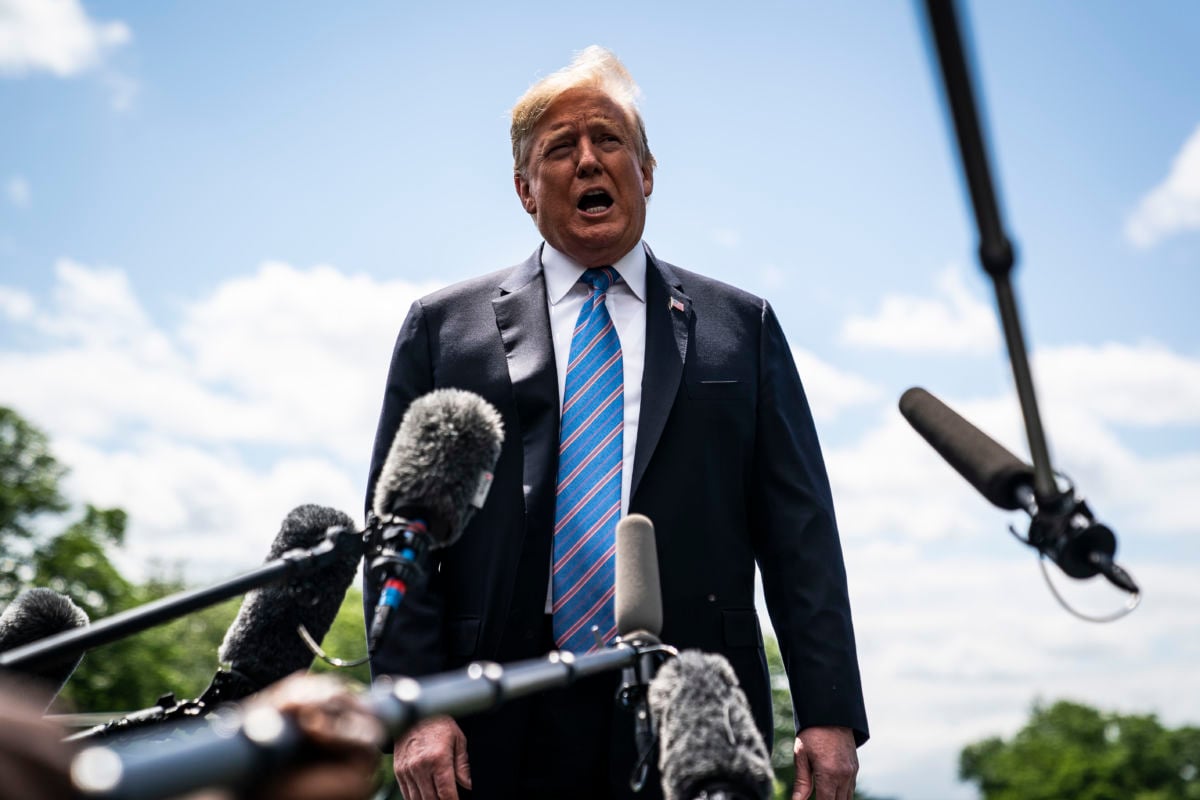As military tensions between the U.S. and Iran appeared to be gradually cooling despite dangerous provocations from the White House, President Donald Trump — who said publicly last week that he hopes there is not another war in the Middle East — took to Twitter Sunday to threaten “the official end of Iran,” a remark numerous critics condemned as “genocidal.”
“If Iran wants to fight, that will be the official end of Iran. Never threaten the United States again!” Trump tweeted, without specifying how Iran threatened the United States.
Matthew Gertz, a senior fellow at Media Matters for America, speculated that Trump’s threat was prompted by a Fox News segment on Iran.
If Iran wants to fight, that will be the official end of Iran. Never threaten the United States again!
— Donald J. Trump (@realDonaldTrump) May 19, 2019
The U.S. president’s tweet came after a rocket was reportedly fired into Baghdad’s fortified Green Zone, about a mile away from the U.S. Embassy in Iraq. There is no evidence that Iran-backed forces were behind the attack, despite reported “suspicions” from Western diplomats.
Jamal Abdi, president of the National Iranian American Council (NIAC), said in a statement late Sunday that a “similar incident” in Iraq last year “led to Bolton asking the Pentagon for options to militarily strike Iran.”
“President Trump’s saber-rattling about Iran has reached a dangerous new low with his threat to ‘end’ Iran — a country of 83 million men, women, and children,” Abdi said. “There is no doubt that national security adviser John Bolton will use the slightest Iranian action — even bereft of reliable intelligence — as a pretext to push for the war he’s always wanted.”
“President Trump has claimed that he doesn’t want war, but his bombastic rhetoric is ensuring that he walks into one,” Abdi added. “If Trump is sincere about wanting diplomatic compromise, he should cease his policy of economic warfare that is strangling the Iranian people and pursue a tone of mutual respect with Tehran.”
Describing Trump’s tweet as “genocidal rhetoric,” NIAC founder Trita Parsi outlined steps the president should be taking if he actually desires peace with Iran:
By now, you should've learned that making genocidal threats won't make Iran budge.
If you want peace, prepare a serious strategy for diplomacy:
Step 1: Fire Bolton
Step 2: Respect the JCPOA, i.e. lift sanctions
Step 3: Drop all preconditions
Step 4: Adopt respectful rhetoric— Trita Parsi (@tparsi) May 19, 2019
Trump’s latest threat against Iran came just days after reports on U.S. intelligence challenged the White House narrative of a growing Iranian “threat” in the region, which has been used by American officials like Bolton and Secretary of State Mike Pompeo to justify aggressive posturing in the Persian Gulf.
The president’s tweet also came as some corporate media outlets and commentators have portrayed Trump as a lone voice against war with Iran in a White House filled with hawks.
For all those people who still think Trump is displeased with and resisting the genocidal neocons he chose to surround himself with https://t.co/UyLgUk9HoV
— Whitney Webb (@_whitneywebb) May 19, 2019
According to the Wall Street Journal, Iranian actions in the Middle East in recent weeks have been defensive moves in response to fears that the U.S. could be planning a military attack.
So according to @WSJ, US-Iran tensions spiked as follows:
1. Hawkish US officials intensify pressure on Iran.
2. Iran fears attack.
3. Iran prepares counter-strikes.
4. US gets spooked, raises threat level.
5. Trump demurs: wants talks, not war.https://t.co/RNyrzamfyr— Louisa Loveluck (@leloveluck) May 17, 2019
As Common Dreams reported, Iranian President Hassan Rouhani earlier this month called for diplomacy amid U.S. belligerence and urged new negotiations on the Iran nuclear accord, which Trump unilaterally violated last May.
“Since the president reneged on the Iran nuclear deal last year,” said Abdi, “the administration’s policies have been geared towards provoking Iran into retaliation to give cover for a perilous escalation favored by administration hawks.”
“Simply stated, the current state of heightened tensions between the U.S. and Iran is exclusively due to the policies of the Trump administration, which abandoned a nonproliferation agreement that was working in favor of a so-called ‘maximum pressure campaign.'”
We have 9 days to raise $50,000 — we’re counting on your support!
For those who care about justice, liberation and even the very survival of our species, we must remember our power to take action.
We won’t pretend it’s the only thing you can or should do, but one small step is to pitch in to support Truthout — as one of the last remaining truly independent, nonprofit, reader-funded news platforms, your gift will help keep the facts flowing freely.
